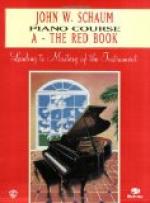“Students think they cannot memorize, when it would be quite easy if they would apply themselves in the right way. I ask them to look intently at a small portion, two measures, or even one, and afterward to play it without looking at the notes. Of course, as you say, this can be done away from the piano; the notes can even be recited; but there are other signs and marks to be considered and remembered, so when one can be at the piano I consider it better.
“Piano playing is such an individual and complex thing. I do not require nor expect my pupils to play as I do, nor interpret as I interpret, for then I would only see just so many replicas of myself, and their individuality would be lost. I often hear them play a composition in a different way and with a different spirit from the one I find in it. But I don’t say to them, ‘That is wrong; you must play it as I do,’ No, I let them play it as they see and feel it, so long as there is no sin against artistic taste.
“I trust these few points will be helpful to both player and teacher. The latter needs all the encouragement we artists can give, for in most cases he is doing a good work.
“Volumes might be added to these hurried remarks, but for that my time is too limited.”
IV
SIGISMOND STOJOWSKI
MIND IN PIANO STUDY
Mr. Sigismond Stojowski, the eminent Polish pianist and composer, was found one morning in his New York studio, at work with a gifted pupil. He was willing to relax a little, however, and have a chat on such themes as might prove helpful to both teacher and student.
“You ask me to say something on the most salient points in piano technic; perhaps we should say, the points that are most important to each individual; for no two students are exactly alike, nor do any two see things in precisely the same light. This is really a psychological matter. I believe the subject of psychology is a very necessary study for both teacher and student. We all need to know more about mental processes than we do. I am often asked how to memorize, for instance—or the best means for doing this; another psychological process. I recommend students to read William James’ Talks on Psychology; a very helpful book.
“The most vital thing in piano playing is to learn to think. Has it ever occurred to you what infinite pains people will take to avoid thinking? They will repeat a technical illustration hundreds of times it may be, but with little or no thought directed to the performance. Such work is absolutely useless. Perhaps that is a little too strong. With countless repetitions there may at last come to be a little improvement, but it will be very small.




